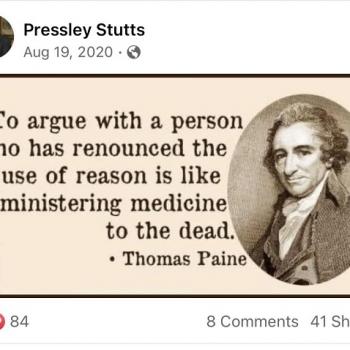Lately, The Secret – a movie and its companion book produced by Rhonda Byrne – have been burning up the bestseller lists and have attracted endorsements from influential celebrities such as Oprah Winfrey. Marketed in the self-help genre, it promises viewers the key to achieving all their life goals through the power of positive thinking. (The name is a misnomer, since The Secret‘s teachings are hardly a secret but have been a prominent part of New Age belief systems for decades, dating back at least to 1906 and William Walker Atkinson’s book Thought Vibration or the Law of Attraction. Antecedents can also be found in the Christian “Word of Faith” movement). The only original part about any of this is the marketing, and slick marketing it is: a video with flashy computer graphics, ominous whispers in the background, and dark hints of a grand, Da Vinci Code-type conspiracy to suppress this film’s supposedly explosive truth.
The idea that a person, by keeping an optimistic and hopeful attitude towards life, can notice opportunities they might otherwise have missed and succeed by persevering where a pessimist might have failed – this is uncontroversially true. But that is not what The Secret is claiming. Its central claim is a far more radical one: that you can have literally anything you dream about or wish for delivered to you by supernatural power, with no effort required on your part, if only you believe strongly enough that this will happen. This is what the film calls the “Law of Attraction”, or as it is summed up in the obligatory pithy slogan, “Thoughts become things”. The film also states that this is an infallible natural law, as certain in its operation as gravity.
Some people have misinterpreted The Secret as saying merely that a person can achieve their goals through positive effort and hard work. Again, this is an incorrect description. The Secret is explicit in its claim that no work whatsoever is required to make your wishes come true. All it takes is a clear expression of your desire and sufficient faith in the power of the “law of attraction”. The film lists three, and only three, steps to having your desires fulfilled: “ask, believe, receive”. In fact, hard work is actively discouraged, as in one section of the movie where an interviewee suggests adjusting one’s attitude from the negative “You have to work hard for money” to the allegedly more positive “Money comes easily and frequently”. The film goes so far as to compare the universe to Aladdin’s genie, who in the original version of the tale granted not just three but an unlimited number of wishes.
Most New Age philosophies make at least a token effort to urge viewers to use their superpowers for spiritual growth and moral development, but The Secret is unabashedly materialistic in its implications. It is calculated to appeal directly to its viewers’ sense of greed. It goes out of its way to dazzle with stories and images of multimillion-dollar bank accounts, mansions on the beach, luxury cars and speedboats, marriage to beautiful trophy spouses, and checks arriving in the mail apparently for no reason at all. All these things can be yours, we are told, if only you believe. To no one’s surprise, I’m sure, there is no evidence whatsoever presented at any point that any of this works – only scattered anecdotes.
But The Secret is not just selfish and frivolous, it is dangerous. Consider posts by Secret believers such as this one, in which the author informs readers that weight loss can be achieved magically, without any need to eat healthy food or exercise:
You see…it’s not about how you eat, exercise (none) or anything like that. It’s the representation in your mind of where you actually are. If you believe the perfect you is 185 lbs and you can see yourself as that weight every day, your body has no choice but to move you closer to that state.
The logical conclusion of such transparently absurd reasoning is that it does not matter how many donuts, sodas, hamburgers, or other sources of empty calories and fat you consume. If you wish hard enough to be thin, you will be thin. This is grossly irresponsible advice and could very well endanger people’s health.
But even more horrifying is this woman who proudly informed Oprah Winfrey that, based on her belief in The Secret – in particular, a scene in which another interviewee claims to have cured herself of cancer by watching funny movies – she was choosing to stop medical treatment for her own malignant breast cancer and start wishing to get better:
After watching the DVD and seeing The Oprah Show about The Secret, Kim wrote to Oprah after she was diagnosed with breast cancer. Three doctors told Kim she would have to have a partial radical mastectomy of the right breast and treatment. Kim writes that “after much thought, I have decided to heal myself.”
…”But we do have choices, and I’m making a choice. And in six months’ time, I am believing that the cancer will be gone — and if it is not, it has shrunk so much that I can have a lumpectomy not a partial radical mastectomy,” Kim says. “It’s about holding onto my right for choice.”
Breast cancer that is caught and treated early can very often be cured. Breast cancer that is allowed to grow, while the bearer concentrates on wishing for magical healing, may not be so treatable. It is very possible that this woman’s belief in The Secret will lead to her early and needless death.
The Secret‘s metaphysics are inconsistent and contradictory even when taken on their own terms. In one scene, we are shown a man who wanted to promote his self-help books through the National Enquirer and was then approached by a writer from that very paper who was interested in interviewing him. He bragged about how his positive desire had “attracted” her to him. But in a scene just a few minutes later, we are informed that “we cannot control other people, no matter how hard we try”.
A related and obvious issue which The Secret never even touches on is this: what happens if two people desire contradictory things? What if one person wills a particular political candidate to be elected, for example, while another wills their opponent to be elected? What if one person wills there to be war and another wills peace? What if one person tries to use the “law of attraction” to get to work quickly and with no traffic, while another person using the same road tells themself, “I hope I don’t get stuck in a traffic jam” and thereby unknowingly attracts that very thing?
If the answer is that whoever wills their desired outcome more strongly will get it, then The Secret‘s repeated claims that the “law of attraction” always works are false. You might wish for something with all your might, and still fail to get it because someone else wished that even more strongly. Or Secret advocates might claim that whoever has the more “positive” desire will get what they want; but in that case their claims about the infallibility of the “law of attraction” are still false, and this still does not answer the question of what happens when two people wish for positive but incompatible outcomes.
There is one more claim made by The Secret, the most vile and invidious of them all. The film’s interviewees claim that you get whatever you think about – even a claim such as “I wish I wasn’t in debt” will attract more debt. The consequence of this, and it is a consequence that the film states explicitly, is that anything bad that happens to you is your own fault for “attracting” it to yourself. Anything – poverty, cancer, the death of a loved one, the loss of a job or a home, or any other disaster or misfortune – is the victim’s fault.
Not only is this attitude cruel and callous in the extreme, there are many cases where it would discourage people from engaging in the hard work actually needed to improve everyone’s lives. For instance, the film states that the reason for the enormous wealth gap that existed in the early 1900s was not because of entrenched societal inequalities and political corruption, but because the robber barons knew the Secret and ordinary working people did not. Similarly, we are told that “the anti-war movement creates more war” and instead people should concentrate on wishing for peace. If this attitude was widely adopted, people would soon cease participating in political action to bring about change for the better, and instead spend their time sitting at home and wishing for things to improve. Not only would this not work, it would clear the way for the selfish elite who so often are the cause of society’s problems.
There is much more I could say about The Secret, such as the laughable pseudoscientific claims dispensed by the interviewees (“a positive thought is scientifically proven to be a hundred times more powerful than a negative thought”), the even more laughable and simply wrong scientific claims (“no one knows how electricity works”), the obligatory invocations of garbled quantum physics, and so on. But I will not belabor the point. Instead, I’ll point out in closing that The Secret, which represents humanity’s desire for magic distilled down to its essence, is a letter-perfect illustration of what I wrote about last August in the post “No Miracles“:
More than anything, we desire easy answers, and all these different types of supernatural belief stem, ultimately, from that desire. When life is difficult and troubled, we want miracles that will fulfill our needs and supply our wants in a supernatural flash, without the work otherwise needed to get what we want…
The appeal of magic is that it promises easy answers, easy victories, easy achievement of our goals with little effort and toil. But this is, and always was, a childish dream. Through cooperating with each other and studying the world around us, we can learn to better control our circumstances and improve our lives, but such improvement will always take labor and work. The lure of easy answers is an illusion; there are answers, but they are difficult to obtain and always were. Yet that does not make them worth any less. On the contrary, it makes them even more precious, and should increase our appreciation for what progress we have brought about and our resolve to make further progress in the future.
Although I have little to say to people who are at this moment fervently wishing for their ski lodge in Aspen or beach condo in Hawaii, I have nothing but sympathy for people in hard straits trying to use The Secret to obtain the basics that they need. Truly, I understand this drive. I’m not saying everyone does not deserve health and happiness. But this is not the way to go about it. Puerile mysticism has never brought humanity anything but disappointment and heartbreak, and the only people who will get rich thanks to The Secret are its creators, who are at this moment very handily fattening their bank accounts with the hard-won dollars of those who are ever eager for miracles.












